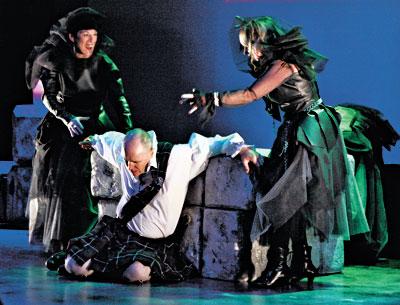Round Table Takes On ‘The Scottish Play'

“The Scottish Play” is the title many people substitute for “Macbeth” when inside the theater, not because they are interested in geography, but because, according to an ancient theatrical superstition, speaking the title aloud in a theater will bring calamity upon the speaker and the theater itself.
But only good luck was in the air at the Friday night debut of William Shakespeare’s bloody masterpiece, produced by the Round Table Theatre Company and Academy at LTV Studios in Wainscott.
How else to explain the rain, which poured down on the roof as the play began and continued throughout the evening? Rain is the perfect background sound for this eerie, mystical tragedy, set in Scotland 1,000 years ago.
Good luck, too, is the presence of Jeff Keogh in the title role. He has an excellent understanding of the language and the part, and plays Macbeth with a haunted, compulsive clarity.
Further good luck was in evidence in the form of the able Morgan Vaughan playing Lady Macbeth, and, of course Josh Gladstone, who was, in turns, dramatic as Ross and hilarious as the Porter.
In all of Shakespeare’s tragedies, a fool will emerge, who frequently seems to serve no purpose but to make the audience laugh.
Usually, Shakespeare arms the fool with double entendre, always, at some point, focusing on sex. It is good to know that not much has changed in us humans in certain areas: Ribald Shakespeare made us laugh 400 years ago and makes us laugh now, as long as the material is in the hands of a talented performer like Mr. Gladstone, who is better known as the artistic director of the John Drew Theater at Guild Hall.
Shakespeare is a sexual writer. There is a palpable passion in his characters. The passion, in Macbeth, is for bloodlust.
The Macbeths are a happy, loving couple. He sends her missives when he is at work in the field, his work being that of a killer. Nominally, he kills for his king, Duncan, but in fact, it is his profession. He kills to live, and he lives to kill.
Macbeth receives a prophecy from three witches at the beginning of the play that he is to become king. They do not tell him how, but his mind immediately jumps to the murder of Duncan.
He is a simple man complicated by a vivid imagination. He writes his wife about his plan, then circles back in his mind, questioning it.
There are no circles in Lady Macbeth’s mind. She sees a straight line through Duncan to the crown.
The deed is done. Both their hands are covered in blood. “A little water clears us of this deed. How easy is it, then,” Lady Macbeth tells her husband.
It is, of course, anything but easy. He is haunted, seeing ghosts at the dinner table, goading him into more and more bloodshed. She, in turn, descends into madness, and death. “Life’s but a walking shadow, a poor player that struts and frets his hour upon the stage, and then is heard no more. It is a tale told by an idiot, full of sound and fury, signifying nothing,” says Macbeth at the end.
With that, Shakespeare leaves us with as bleak a vision of existence as in any of his tragedies.
Playing Shakespeare provides a pair of unique challenges to contemporary actors. In modern theater, acting comes from what is not said as by what is said. The truth of the character is not in the words he speaks, it is beneath the words, hidden in the subtext.
With Shakespeare, the opposite is true. The truth of the character is all in the words.
Once an actor grasps that concept, which is not as easy as it sounds, he comes to the second challenge — the language itself.
This is not contemporary, casual speech. Written mostly in iambic pentameter, an actor must give him or herself over to the flow of the words, the structure of the language. Diction is essential, as is vocal power, which should not be confused with volume.
Trust the language Shakespeare has given us, and your performance will ring true.
The performance levels in this production are uneven, which is to be expected from a fledgling company in which many of the actors are still learning, but over all, the company has accomplished its mission in its first fully-staged production, sending us out into the night, appreciating the glory that is Shakespeare.
“Macbeth” can be seen tomorrow and Saturday at 8 p.m. and Sunday at 2 p.m. at LTV Studios. The cost at the door is $25, $15 for students and those over 65.
